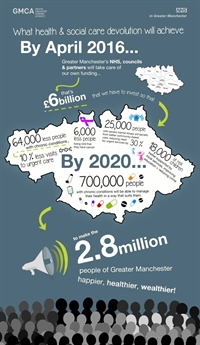01.12.15
Regions could lose devolved health budgets without consent, minister admits
Whitehall will be able to take back devolved health responsibilities from a local authority and health economy if it fails to deliver, care minister Alastair Burt MP has admitted.
During a Communities and Local Government Committee inquiry on the government’s Devolution Bill yesterday (1 December), the care minister revealed that the health secretary will retain overarching ‘backstop’ powers over devolved health budgets to make sure they stay in line with what the NHS must deliver.
There is already a power in the Bill to recover devolved responsibilities ‘with consent’ from combined authorities, should they be failing to keep up with deals.
But Burt said: “Of course, there may be circumstances in which that consent may not be forthcoming because of local difficulties, so it is anticipated that the secretary of state may have to have additional powers to ensure that, to prevent any potential failings, the powers are directly returned.”
Committee member Liz Kendall MP, a former shadow health minister, asked if that would mean further legal changes to the Bill in case councils didn’t want to return powers. Burt said: “That might be the case, and that might come forward fairly soon”.
But the care minister guaranteed that existing regulators will retain their primary oversight post-devolution, exercising preventative control in areas where there might be failings to anticipate issues and recommend improvements.
“Should that be in an NHS context, then, again, the powers that are already there to make sure the NHS delivers will remain the same,” he said. “But if ultimately there is a failing, then yes, it is a secretary of state’s duty.”
Kendall also questioned how these regulators would work after combined authorities take over health commissioning, including if Monitor and NHS Trust Development Authority (TDA) would be able to inspect the finances of councils as well as the NHS.
“I think those that currently regulate both finances and the quality of services will remain liable to do so, but they will be able to regulate them and monitor them over the wider geographical area that a new structure may provide,” Burt said.
“I don’t think their functions have changed. They retained the same functions, but they’re able to cover the new areas as set up. NHS Improvement and the CQC will continue to regulate provider organisations, but don’t have a role around commissioning, so they wouldn’t have a role for combined authorities.”
Although Kendall said she did not “feel terribly clear” about that, the care minister reiterated the government was not looking to create a separate regulatory structure to deal with council and NHS integration.
When questioned as to whether NHS regulatory bodies would start regulating combined authorities when they commission services, Burt said that, operationally, they are already exploring how to work more closely with devolved areas to support a holistic approach to regulation.
He added: “Monitor and NHS TDA acting as NHS Improvement may, through discussions with devolved areas, adapt approaches to provide a regulation. This could include place-based approaches to provide a regulation, an exploration of flexibilities for regulation and assurance of new legal entities that operate on a larger footprint than the traditional organisational units.
“So the sense is that recognising that the footprint, the ground print of commissioners, may well change – and the ground print of providers may change. So yes, the regulatory bodies are working in tandem with that to make sure that powers cover the wider footprint of the areas that will be commissioning and providing.”
Speaking to the committee’s chair, Clive Betts MP, Burt said he “genuinely did not know” why most councils currently signing off devolution deals are not setting out proposals for devolved powers over health.
Currently, only Greater Manchester has gained control over a £6bn NHS budget, while the north east is exploring options for health and social care integration.
Katy Calvin-Thomas, who is helping lead the ‘Devo Manc’ health and social care transformation, on secondment from her executive director post at Pennine Care NHS Foundation Trust, spoke at a recent ‘Northern Powerhouse’ conference on that issue.
 She said at that conference, attended by NHE: “The devolution deal around health and social care happened very quickly for Greater Manchester and I think we are still the only city that has health and social care as part of its devolution deal. There’s probably a very good reason for that – which is that it is an absolute nightmare. It is a very, very difficult piece [of work] to do. It’s absolutely the right thing to be doing, but it’s massively challenging.”
She said at that conference, attended by NHE: “The devolution deal around health and social care happened very quickly for Greater Manchester and I think we are still the only city that has health and social care as part of its devolution deal. There’s probably a very good reason for that – which is that it is an absolute nightmare. It is a very, very difficult piece [of work] to do. It’s absolutely the right thing to be doing, but it’s massively challenging.”
At the committee hearing, Burt said: “We’re already working as best we can to try and encourage integration of services in any case. Devolution complements what is already going on, and provides a further route for the integration of services, but there’s already integration of NHS and local authority services going on in any case.”
But committee member Alison Thewliss, MP for Glasgow Central, warned him that in her city, integration between councils and the NHS fell apart because local authorities were not prepared to devolve budgets.
Yet this could be avoided with adequate oversight of how that combined working will work together, the care minister said.
“That will be part of the order that the secretary of state will use to sign off devolution proposals. Regulatory authorities working together must be effectively set out in devolution proposals to make sure the oversight can be provided,” he concluded.